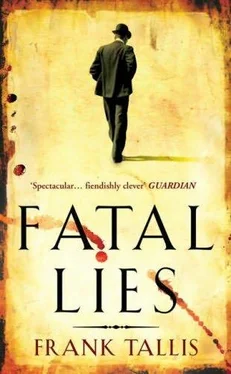Frank Tallis - Fatal Lies
Здесь есть возможность читать онлайн «Frank Tallis - Fatal Lies» весь текст электронной книги совершенно бесплатно (целиком полную версию без сокращений). В некоторых случаях можно слушать аудио, скачать через торрент в формате fb2 и присутствует краткое содержание. Жанр: Исторический детектив, на английском языке. Описание произведения, (предисловие) а так же отзывы посетителей доступны на портале библиотеки ЛибКат.
- Название:Fatal Lies
- Автор:
- Жанр:
- Год:неизвестен
- ISBN:нет данных
- Рейтинг книги:3 / 5. Голосов: 1
-
Избранное:Добавить в избранное
- Отзывы:
-
Ваша оценка:
- 60
- 1
- 2
- 3
- 4
- 5
Fatal Lies: краткое содержание, описание и аннотация
Предлагаем к чтению аннотацию, описание, краткое содержание или предисловие (зависит от того, что написал сам автор книги «Fatal Lies»). Если вы не нашли необходимую информацию о книге — напишите в комментариях, мы постараемся отыскать её.
Fatal Lies — читать онлайн бесплатно полную книгу (весь текст) целиком
Ниже представлен текст книги, разбитый по страницам. Система сохранения места последней прочитанной страницы, позволяет с удобством читать онлайн бесплатно книгу «Fatal Lies», без необходимости каждый раз заново искать на чём Вы остановились. Поставьте закладку, и сможете в любой момент перейти на страницу, на которой закончили чтение.
Интервал:
Закладка:
They arrived at their destination-a small apartment building at the end of a gloomy cul-de-sac. The woman did not have to wake a concierge to gain admittance-the door was standing wide open. A tiled arcade led to a courtyard, on the other side of which was a short iron staircase leading to a sheltered landing. A solitary gas lamp agitated the flagstones with a muted yellow lambency.
The woman stopped and-looking toward the stairs-said, “I think I can manage the remainder of the journey on my own.” The statement was nuanced with a hint of dry humor.
Liebermann found himself looking at the woman properly for the first time. She was very beautiful-but not in the sense that her features conformed to a classical ideal. Her beauty was less conventional-less finished, less tame. She had long dark hair tied up loosely in a head scarf. Her mouth was generous, and her long straight nose gave her face unusual strength. The arch of her eyebrows was gentle-the extremities rising rather than falling at the temple. This peculiarity created the illusion of otherworldliness, recalling storybook illustrations of elves and sprites. From her ears dangled two ornate silver earrings, encrusted with black stones. Liebermann remembered the way she had been insulted- Gypsy bitch — and there was indeed something Romany, something exotic about her appearance.
Hungarian women were reputed to possess a unique and potent beauty, and in her case the reputation was clearly merited.
Liebermann bowed and pressed his lips against her hand. Rising, he said: “I don't know your name.”
“Trezska Novak,” she replied.
Liebermann suddenly felt awkward. “Well, Fraulein Novak… good night.”
“Good night, Herr Dr. Liebermann.” She took a few steps, and then stopped and, looking back, added, “I am indebted-truly.”
He watched her cross the courtyard, ascend the stairs, and unlock the door of her apartment. Before she entered, she waved. Lieber-mann returned the gesture, again feeling awkward-as if his arm had become a cumbersome appendage. He heard the sound of a bolt engaging but did not move to leave. Instead, he continued to stare at the empty landing. The gas lamp sputtered.
Quite suddenly, Liebermann was overwhelmed with curiosity: he wanted to know more about Trezska Novak and regretted not having asked her more questions. He had talked too much about himself-the hospital, hysteria, Professor Freud. What was she doing in Vienna? And why was an educated woman living in such a district? Shaking his head, he rebuked himself-it was none of his business. He should be getting home.
Reluctantly, Liebermann made his way back to the street, where he became aware that his shoulder was hurting badly and that he was extremely tired (almost to the point of exhaustion). He set off toward the canal, praying that he would find a cab.
24
“Where have you been, Rheinhardt?”
“Following Herr Kiss, sir-as instructed by Inspector von Bulow. I began my surveillance outside his apartment in Landstrasse at six-thirty this morning and-”
Brugel shook his bovine head. Evidently he did not want to hear about Herr Kiss.
“Have you seen this?” The commissioner was holding a folded newspaper in his hand.
Rheinhardt shook his head.
Brugel handed him the Arbeiter-Zeitung.
“Do you know it?”
“Yes, a socialist daily-isn't it?”
“Sit down, Rheinhardt… and turn to page ten.”
An article had been circled in red ink. The recent death, of a young cadet at Saint Florian's oberrealschule — reported in the Neue Freie Presse on the 19th of January-served to re-mind me of my own school days, spent at that very same educational establishment…
Rheinhardt read on, his heart accelerating as his eyes were drawn down the page by words that seemed to stand out from the text in bold relief. Sadism… cruelty… torture…
He made a supreme effort to calm himself, returned to the beginning, and attempted to read the article without skipping. I was a pupil at Saint Florian's from 1893 to 1896 and can say, without fear of exaggeration, that these were the most unhappy years of my life.
The writer went on to describe a culture of violence, which he claimed was tacitly endorsed by the headmaster and senior members of staff. His most startling assertion, however, was that the suicide of a boy reported in 1894 was, in fact, a case of manslaughter, being the direct result of a heinous practice known as “doing the night watch.” This was a form of punishment meted out by older boys, in which the victim was made to stand on a dormitory window ledge from “lights out” until dawn. Sadly for Domokos Pikler a nocturnal cloudburst made the ledge slippery, and he fell to his death.
Rheinhardt drew the paper closer. I hope that the authorities-such as they are-will be mindful of this, my candid and truthful revelation. Alas, for personal reasons my identity must remain undisclosed. Sincerely, Herr G., “Vienna.
When Rheinhardt had finished reading, he placed the newspaper on Brugel s desk.
“Pikler… Pikler,” said Rheinhardt. “I don't remember the name.”
“One of old Schonwandt's cases. He retired the following year… not a very competent detective.” The commissioner said nothing for a few moments-and his habitual scowl became even darker and heavier than usual. “This afternoon,” he continued, “I received a telephone call from one of the education minister's aides. He discoursed-at some length-on the importance of maintaining public confidence in Austria's military schools and hoped that, should the article you have just read come to the emperor's attention, Minister Rellstab will be able to assure His Majesty that the security office treats such accusations very seriously and that any fatalities occurring in military schools are always thoroughly investigated. I explained that you were still in the process of making inquiries… and that you would be submitting a final report on the death of Thomas Zelenka in due course.”
“But, sir… I can't possibly proceed with my pursuit of Herr Kiss and continue investigating Zelenka's death. Saint Florian's is situated in the woods: a long drive from the center of Vienna. It would take me-”
“You are no longer operating under Inspector von Bulow's command,” the commissioner interrupted.
“I have your permission to return to Saint Florian's?”
Brugel nodded dismissively He did not have the good grace to articulate an affirmative response.
“Thank you, sir,” said Rheinhardt, suppressing the urge to leap from his chair and exclaim with delight.
For once, Rheinhardt left the commissioner's office in a happy mood. He swaggered down the corridor, humming the ebullient victorious theme from the final movement of Beethoven's Fifth Symphony.
He rapped on von Bulow's door, waited an inexcusably long time for permission to enter, and found von Bulow hunched over his desk, writing a report with a gold fountain pen. The supercilious inspector did not look up. His bald pate shone like a billiard ball.
“Von Bulow?”
“Ah, Rheinhardt, I'm glad you're here… There's something I need you to do this afternoon.”
Von Bulow kept his head bowed and continued with his task.
“I'm afraid,” said Rheinhardt, “that you'll have to get your assistant to do it.”
The shiny bald pate was suddenly replaced by von Bulow's angry face.
“What did you say?”
“You'll have to get your assistant to do it,” Rheinhardt repeated, enunciating each syllable as if he were talking to someone who was partially deaf.
“That isn't possible,” said von Bulow coldly. “He's otherwise engaged.”
“Then you'll have to do it.”
Von Bulow's eyes narrowed as he grasped the significance of Rheinhardt's airy insolence.
Читать дальшеИнтервал:
Закладка:
Похожие книги на «Fatal Lies»
Представляем Вашему вниманию похожие книги на «Fatal Lies» списком для выбора. Мы отобрали схожую по названию и смыслу литературу в надежде предоставить читателям больше вариантов отыскать новые, интересные, ещё непрочитанные произведения.
Обсуждение, отзывы о книге «Fatal Lies» и просто собственные мнения читателей. Оставьте ваши комментарии, напишите, что Вы думаете о произведении, его смысле или главных героях. Укажите что конкретно понравилось, а что нет, и почему Вы так считаете.












